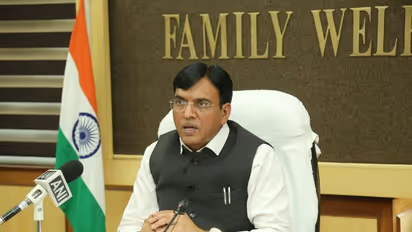Zero tolerance on spurious medicines: Union health minister on cough syrup row

Synopsis
The World Health Organization (WHO), on April 26, 2023, flagged the issue of contaminated cough syrup made by an Indian company. According to the latest warning issued by the WHO, contaminated syrups were found in the Marshall Islands and Micronesia-- a country spread across the western Pacific Ocean comprising more than 600 islands.
Union Health Minister Mansukh Mandaviya on Tuesday (June 20) chaired a high-level meeting to review public health preparedness and addressed concerns over cough syrup row. Addressing the gathering, the health minister said, "Zero tolerance on spurious medicines and extensive risk-based analysis being done to ensure the quality of medicines."
The Health Minister also asserted that India will never bargain on quality of medicines and always alert to ensure no one dies of spurious drugs.
'4 murders in 24 hours': Delhi CM Arvind Kejriwal writes to Lt Governor VK Saxena over law and order
On April 26, 2023, World Health Organization (WHO), flagged the issue of contaminated cough syrup made by an Indian company. According to the latest warning issued by the WHO, contaminated syrups were found in the Marshall Islands and Micronesia-- a country spread across the western Pacific Ocean comprising more than 600 islands.
Notably, Guaifenesin is an expectorant used to relieve chest congestion and the symptoms of cough. The health agency said that the samples of the syrup from the Marshall Islands were analysed by quality control laboratories of the Therapeutic Goods Administration (TGA) of Australia.
The analysis found that the product contained unacceptable amounts of diethylene glycol and ethylene glycol as contaminants.
The stated manufacturer of the affected product is QP Pharmachem Ltd which is headquartered in Punjab. Besides, the stated marketer of the product is Trillium Pharma which is based in Haryana. In a statement released by the UN health agency, it said, "To date, neither the stated manufacturer nor the marketer has provided guarantees to WHO on the safety and quality of these products."
It also claimed that the product may have marketing authorizations in other countries in the Western Pacific region. It may have also been distributed, through informal markets, to other countries or regions.
It should be noted that the latest alert came nearly six months after more than 300 children, majorly aged under 5, died of acute kidney injury in Gambia, Indonesia and Uzbekistan. The WHO linked the death with contaminated medicines manufactured in India.
Infosys co-founder Nandan Nilekani donates Rs 315 crores to his alma mater IIT Bombay
According to WHO, Diethylene glycol and ethylene glycol are toxic to humans when consumed and can prove fatal.
The substandard product referenced in the latest alert is unsafe and its use, especially in children, may result in serious injury or death. Toxic effects can include abdominal pain, vomiting, diarrhoea, inability to pass urine, headache, altered mental state and acute kidney injury.
Stay updated with the Breaking News Today and Latest News from across India and around the world. Get real-time updates, in-depth analysis, and comprehensive coverage of India News, World News, Indian Defence News, Kerala News, and Karnataka News. From politics to current affairs, follow every major story as it unfolds. Get real-time updates from IMD on major cities weather forecasts, including Rain alerts, Cyclone warnings, and temperature trends. Download the Asianet News Official App from the Android Play Store and iPhone App Store for accurate and timely news updates anytime, anywhere.